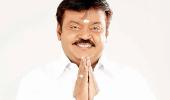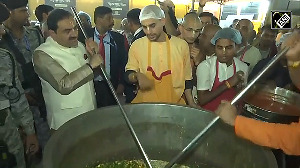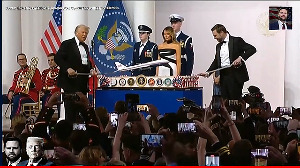The Tamil film industry won't forget Vijayakanth's large-heartedness, how he took care of fellow industry persons, male or female, rich or poor, young or old...recalls N Sathiya Moorthy.
How he sent money quietly for the family of a stunt artiste to meet his funeral expenses, how he always ensured that all female co-stars, including junior artistes, had secure accommodation on outdoor shoots, and how he would always the first to rush help if anyone from the fraternity was in distress.

'As a political leader, he was deeply committed to public service, leaving a lasting impact on Tamil Nadu's political landscape. His passing leaves a void that will be hard to fill.' Photograph: ANI Photo
'Black MGR' to fans and his party workers and the poor producer's Rajinikanth when the latter was at the peak of his own career, actor-politician Vijayakanth, who died on Thursday, December 28, 2023, aged 71, will be remembered more for his ready-to-rush philanthropy, more off-screen than even on-screen.
Or, that is the prime image that Tamil industry people, from junior artistes to big-ticket producers, not to leave out fellow actors, who were his as much competitors same-generation as compatriots have had to say on dozens of YouTube channels and live TV shows through the past two-to-three years of in-and-out hospitalisation.
If, however, he is not being remembered for his politics, after his Desiya Murpokku Dravidar Kazhagam (DMDK) garnered a substantial 8.5 per cent vote-share in the 2006 Tamil Nadu assembly election after launching the party just months before the polls, he alone was to blame for the downslide that followed a higher 10.3 per cent vote in the 2009 Lok Sabha polls where he did not have a prime minister candidate, unlike the well-established DMK and AIADMK alliances that were also shy of contesting without allies and alliances.
Truth be told, the DMDK, whose Tamil name translates as 'Nationalist Progressive Dravidar Kazhagam' in English, was a khichdi of political ideology at birth.
The reason was not far to seek. Vijayakanth saw a vacuum emerging in state politics after the alternating electoral defeats of the DMK (1991, 2001) and AIADMK (1996, 2004).
He was not exactly in a hurry to enter politics when the first opportunity presented itself, but was keen to know the voter mood in Elections-1996, which saw AIADMK chief minister J Jayalalithaa losing power and also her own seat.
Yet, the talk of superstar Rajinikanth's imminent entry into poitics that did not happen at all meant that Vijayakanth saw no point in waiting, as he was keener on serving the people more than making use of his popularity for his filmi ends.
So acceptable had Vijayakanth become as a political star as much as a film, star across the state that he could win the assembly elections from the northern districts, first from Vridachalam (2006) and then in Rishivandhiyam (2011, of course, in the AIADMK's company).
Both constituencies were far away from his native Madurai. That did not make a difference, also when he lost his security deposit later in 2016, also from Rishivandhiyam, for doodling around with alliance politics.
It is said that Vijayakanth's ways with alliance politics and waywardness upset the DMK so much that present-day Chief Minister and current party boss M K Stalin developed cold vibes with him.
That was after Vijayakanth had 'fooled around' with the DMK, settled for A seat-share and other details in the 2011 assembly elections, but walked into the AIADMK camp almost overnight.
Though his father M Karunanidhi was around, Stalin was in charge of the elections, including seat negotiations, and he did not take kindly to what was generally seen as a snub administered by Vijayakanth.

What Vijaykanth did not know, or notice, or was not told by political advisors at the time was that the 8 to 10 per cent vote-share that he had recorded respectively in 2006 and 2009 were the traditional 'non-party' portion of the even more customary 'swing votes', which on most occasions had accounted for double that figure, 15 to 20 per cent.
It had its own limitations, which Vijayakanth understood only after the 2009 poll performance.
Unwilling to give up and unable to muster more votes, he negotiated seriously with the ruling DMK under the late chief minister M Karunanidhi almost until the last minute, but settled for rival AIADMK under Jayalalithaa for the 2011 assembly polls.
It was the best possible political decision as the DMDK's voters in the past were seen as being MGR sympathisers and AIADMK cadres and supporters who did not approve of Jayalalithaa's ways.
There was no way these voters would vote for the DMK or approve of Vijayakanth swaying that way.
The AIADMK was his natural choice, yes, for in the previous decade, fans and sympathisers had begun calling him 'Karuppu MGR' or Black MGR, after the late AIADMK founder and Jayalalitha's film/political mentor, the late M G Ramachandran.
However, by driving a huge bargain with both camps, Vijayakanth sent out a wrong message that the DMK was available (only) to the highest bidder (in terms of so-called election funds that either of them could give him).
When the AIADMK alliance swept the 2011 assembly polls at the height of the 2G scam that had brought a bad name to the ruling DMK in the state, it was Vijayakanth who became the Leader of the Opposition.
The DMDK had won 29 out of 234 seats after the ruling AIADMK's 130 and the DMK rival's 23.
Like the Congress ally in 1991, Vijayakanth was also peeved and upset after Jaya began targeting not the DMK rival, but the DMDK ally.
Silently but surely, she created a 'Jaya DMDK group' within the party without breaking it, to act as a ginger group first and later took them away, leaving the party with just one more MLA than the DMK, if only to ensure that bete noire Karunanidhi did not become Leader of the Opposition.

Unused to the ways of the mainline parties, Vijayakanth went politically astray, so to say, yet demanded and commanded the highest number of seats from the emerging BJP-NDA alliance for the Lok Sabha polls of 2014.
Keen to win as many Tamil Nadu seats as possible, even if by allies, for its prime ministerial nominee Narendra Modi, the BJP leadership was ready to make compromises and negotiate it with other partners like the PMK with a fixed five-per cent vote-share since 1991.
However, Vijayakanth's prevarication and stubbornness sent out a message that more than he, his wife Premalatha (whom he married in 1990) and her brother L K Sudeesh were running the show in his name.
This meant that most neutral voters from 2006 and 2014 either went their way or stayed on in the alliance for the BJP's sake even as 'MGR voters' in his midst returned to the parent fold.
There was no hope left for the party as became clear when Vijaykanth led a third front in the 2016 assembly polls.
The vote-share of the DMDK-centric alliance came down to 6.1 per cent in 2016 as against 18-plus per cent just two years earlier in the 2014 Lok Sabha polls.
The voter's message was clear. The rest, as they say, is history, and the party too has almost gone into history.
The last-minute initiative by Premalatha to have her named DMDK general secretary in Vijayakanth's place too left a bad taste among the cadres present and onlookers even outside the political arena, as the one-time strongman actor needed support not only to walk but also sit on a chair on the dais.
This is already being held against Premalatha and her supporters, if any, in the party, and it could sound the death-knell of the DMDK as a political machine, leave alone an electoral being, in next year's Lok Sabha polls.

Born into an upper-middle class agrarian family as Vijayaraj Alagarswami in the southern temple town, Madurai, in 1952, the youth with a graduate degree changed his name to Vijayakanth when he entered tinsel town with his first acting offering, Innikkum Iravugal in 1979.
That was when a young and coming Maratha youth from neighbouring Karnataka, with the christened name of Shivaji Rao Gaekwad had begun making waves in Kollywood.
If his mentor, the famous film-maker K Balachander renamed him Rajinikanth for his cameo role in Apporva Ragangal in 1975, Vijayaraja's first director M A Kaja did it for him.
In a career spanning three-and-a-half decades, Vijayakanth acted in 154 films, all of them in Tamil.
Given his rural background and the colour of the skin that was dark, and a face that was charming but not really handsome by traditional standards, many film-makers refused to sign him even when producers backed him.
There had been occasions when top-notch heroines rejected him as their hero.
Undeterred, he walked the talk, and that is what made the difference.
First in some negative roles, and later as do-gooder hero, Vijayakanth was soon loved by his fans first and producers later, as he became a 'guarantor' for a good and at time (very) successful runs, especially in what in trade lingo is called 'B' and 'C' centres outside Chennai city.
That was when the heroines who had rejected him queued up to sign up with him.
Of the 154 films that he acted in, 150 were made in the first three decades, from 1979 to 2009.
Of the rest, two of them, he co-acted and produced for his elder son Shanmuga Pandian, whose career just refused to take off.
In fact, the second of the two movies was never completed, also because Vijayakanth first became very busy with political work, and later too ill to stand in front of the camera.
Yet, when his films are recalled, Vijayakanth acted as a do-gooder police officer in 20 of them, and most of the rest also projecting him as a rural/urban youth fighting for a cause.
They all became huge box-office hits and even won state and national-level awards, instituted by governments and private institutions.
In turn, many of them also sought to prepare his fans and also the voter for accepting him as a political leader.
Yet, the best of the Vijayakanth movies is said to be Vaidhegi Kaththirunthal (1984), where he plays a wayward yet do-gooder widower, shunning his people in his native village and moving to another.
Film-maker R Sundarajanm with a series of huge hits to his credit, wrote the entire story to accommodate eight pre-recorded songs composed by music maestro Illayaraja, who insisted on having them all together in the same film, or none at all.
That was also one film that showed Vijayakanth as an actor capable of emoting enough without overdoing it.
Another in the series was Chinna Gounder (1992). In Ramana (2002), he appears as a conscientious college professor who seeks to end corruption by putting together a vigilante group of his former students.
It was a sure message of what to expect of him in social and political life in the years to come.
Yet, the biggest of them all in his film career was Captain Prabhakaran (1991), which retold the story of sandalwood-smuggler Veerappan (played by Mansoor Ali Khan).
The state police ended the brigand's career much later in 2004, but the title of the movie stuck to Vijayakanth's name.
He came to be known as 'Captain' Vijayakanth or just 'Captain', till the end...

It will continue even beyond as film personalities would continue to sing his praise, for his large-heartedness and the care he took of fellow industry persons, male or female, rich or poor, young or old...
How he had sent money quietly for the family of a stunt artiste to meet his funeral expenses, how he always ensured that all female co-stars, including junior artistes, had secure accommodation while on outdoor shoots, and how he would always the first to rush help if not in town and rush to the spot himself otherwise, if anyone from the fraternity, or from his old friends' group, was in some kind of distress, big or small.
And as president of the South India Film Artistes Association, which once was home to all south Indian actors from all four languages but reduced to a Tamil-only affair after the other three shifted their bases over the years, Vijayakanth was said to have gone to any level to ensure that they did what they needed to do for those that had fallen by the wayside.
In one such instance, it is said, to ensure that all artistes took part in an overseas stage show to collect funds to rebuild the association building, he sat on the floor in Rajinikanth's drawing room and would not get up until the superstar gave his commitment, which he also kept.
Yet, '90s kids will remember him more as a politician that could not or did not live by the hopes he had stirred, and someone who went astray the way some of his equally successful compatriots and seniors had done in their times.
He got himself bottled up in the circumstances he found himself in, especially after entering politics, and there was no escaping the deterioration in health, which prolonged for long, and ended the way all those great lives (too) end!
N Sathiya Moorthy, veteran journalist and author, is a Chennai-based policy analyst and political commentator.
Feature Presentation: Aslam Hunani/Rediff.com










 © 2025
© 2025